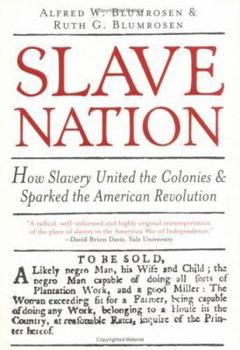Slave Nation: How Slavery United the Colonies and Sparked the American Revolution
Select Format
Select Condition 
Book Overview
The authors (both law, Rutgers U.), begin by examining the Somerset case of 1772, which freed a slave brought to England. This decision convinced slaveholders in the southern American colonies that England intended to end slavery, resulting in the Virginia Resolution, which led to the first Continental Congress of 1774. Northern politicians, seekin
Format:Hardcover
Language:English
ISBN:1402204000
ISBN13:9781402204005
Release Date:January 2005
Publisher:Sourcebooks
Length:336 Pages
Weight:1.51 lbs.
Dimensions:1.3" x 6.5" x 9.1"
Related Subjects
Abolition African Americans African-American Studies Colonial Period Discrimination & Racism Historical Study & Educational Resources History Modern (16th-21st Centuries) Politics & Government Politics & Social Sciences Race Relations Revolution & Founding Slavery & Emancipation Social History Social Science Social Sciences Specific Demographics WorldCustomer Reviews
4 ratings
An important milestone in historical method (ironically !!)
Published by Thriftbooks.com User , 17 years ago
I will not elaborate here my opnion (because, namely, it is that - an opinion); however: is it just me, or is a one-paragraph thumbnail sketch of this text's premise more convincing *after* reading this text than *before*? I've read about sixty monographs and maybe half that many secondary sources on this topic, so I'm certainly no scholar; but the evidence (and by that word I mean "data," not "proof") enclosed here does more to negate the premise than support it. Were it not the reputation garnered by the authors, I would had certainly commended them for slyly suggesting that the information available for supporting their notion - that slavery was a major factor in unionizing the States - is more or less unfounded. I read most of this book in one reading, and was honestly expecting an assertion of "GOTCHA" in an epilogue. But this never happens, and as a result I just have to wonder how convinced the authors are of their suppositions laid out here. Perhaps, *perhaps*, this book needed to be edited, and what was left on the cutting room floor (if indeed there is such a thing in the book editing industry) was important manna; and if this is the case, I certainly owe the authors an apology for supposing the absurd. Indeed, they have done their scholarly rounds. I simply feel uneasy about their conclusions.
A work of painstakingly thorough scholarship combined with a thoroughly "reader friendly" text
Published by Thriftbooks.com User , 19 years ago
Alfred W. Blumrosen is a law professor at Rutgers specializing in Labor and Employment law as it relates to civil rights enforcement, and the late Ruth G. Blumrosen was also a law professor with a history of civil rights compliance: the two have created a monumental survey in Slave Nation; How Slavery United The Colonies And Sparked The American Revolution. Slavery helped found the republic: when a 1772 London judge banned slavery in England, his edict rippled through the colonies and assured the southern states joined the northern colonies in the 'right for freedom' against England which was as much a fight for the freedom to have slaves as for other political concerns. A lively history ensues, pairing political decision processes with insights on the eventual war between the states, Slave Nation is a work of painstakingly thorough scholarship combined with a thoroughly "reader friendly" text that is completely accessible to the non-specialist general reader and a welcome, enthusiastically recommended addition to any personal, community, or school library American History collection or supplemental studies reading list.
Revolting for Slavery
Published by Thriftbooks.com User , 19 years ago
Slave Nation sheds new light on the role of slavery in the creation of the United States of America. The theory that the Somerset case of 1772 had an influence on the American Revolution is not new. In London Lord Mansfield ruled that slavery did not exist in England and that anyone stepping on English soil became free, in particular slaves from English colonies. However, the relative lack of mention of the slavery issue in the written record of events leading up to the Declaration of Independence in 1776 has led most historians to argue that this case, and slavery, were not important causes of the American Revolution. The Blumrosens make a strong case that Somerset was not a secondary cause, but the primary cause of the Revolution. The book should be required reading for all students of American history (and of how history can be warped for political purposes). Its demonstration that in 1772 there was little support for independence, but that the Somerset case propelled the Virginia elite - drug lords, slavers, and usually lawyers as well - to create the Committees of Correspondence, is a great piece of historical detective work.
The influence of the Sommerset case on the Revolution
Published by Thriftbooks.com User , 19 years ago
Studying the American Revolution in isolation can be misleading, and it is important to see the overall context, especially the English one. This book expands this context, and is an entirely remarkable new perspective on the role of slavery in the American Revolution and it is remarkable also that the recently published 'Though the Heavens May Fall' by Steven Wise about the Sommerset case in England seems the perfect introduction to this account (howver, this book amply summarizes the key issues). One could recommend the two together. This case and its pivotal trial resulted in the de facto emancipation of slaves in England. Few histories of the American Revolution properly delineate the sequence of events in the American colonies following this case which in effect established a precedent that sooner or later would effect the status of slavery in colonial America. The cruel irony is that these developments were a crucial factor influencing the Southern slaveholders in their support of the Revolutionary War, not quite the standard version of how it all happened. This interpretation is obvious once pointed out, and requires rethinking almost everything one has read here.





